Analysis of Criminal Justice System Through Expert Interview
VerifiedAdded on 2023/06/15
|8
|2322
|103
Report
AI Summary
This report presents a detailed narrative of an interview with a retired police investigator, focusing on their perceptions of the criminal justice system. The interview covers the investigator's career progression, from a police officer to a detective handling high-profile cases. Key discussion points include the challenges faced, ethical dilemmas encountered, and the importance of continuous professional development within law enforcement. The report also addresses public misconceptions about the police and the need for community policing initiatives to improve relations. Furthermore, the investigator shares insights on the evolving nature of criminal justice in the face of technological advancements and recommends adopting new technologies and retraining staff. The interview concludes with an overview of the strengths and weaknesses of the criminal justice system, emphasizing the importance of integrity and vigilance for those within it. Desklib offers further resources and solved assignments for students studying criminal justice.
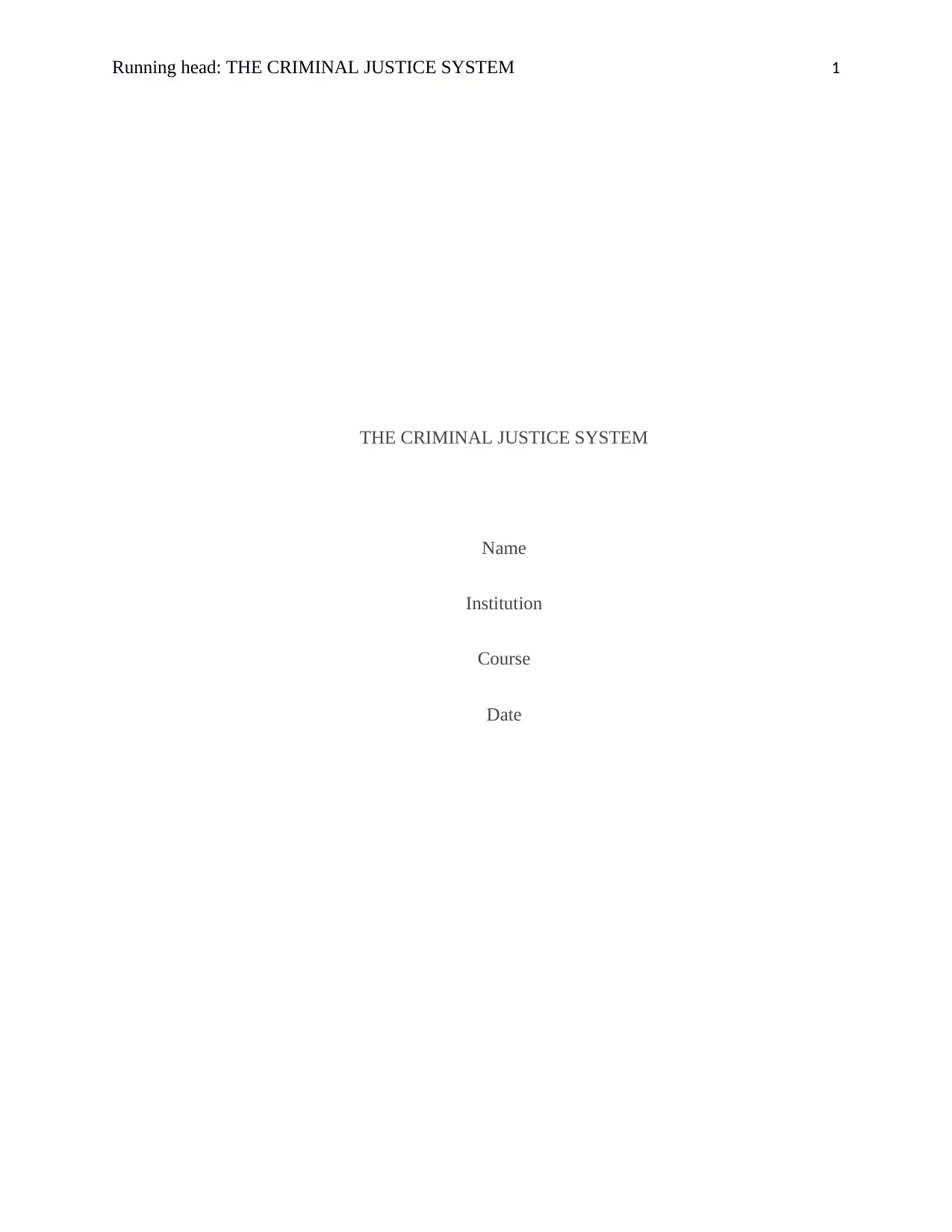
Running head: THE CRIMINAL JUSTICE SYSTEM 1
THE CRIMINAL JUSTICE SYSTEM
Name
Institution
Course
Date
THE CRIMINAL JUSTICE SYSTEM
Name
Institution
Course
Date
Paraphrase This Document
Need a fresh take? Get an instant paraphrase of this document with our AI Paraphraser
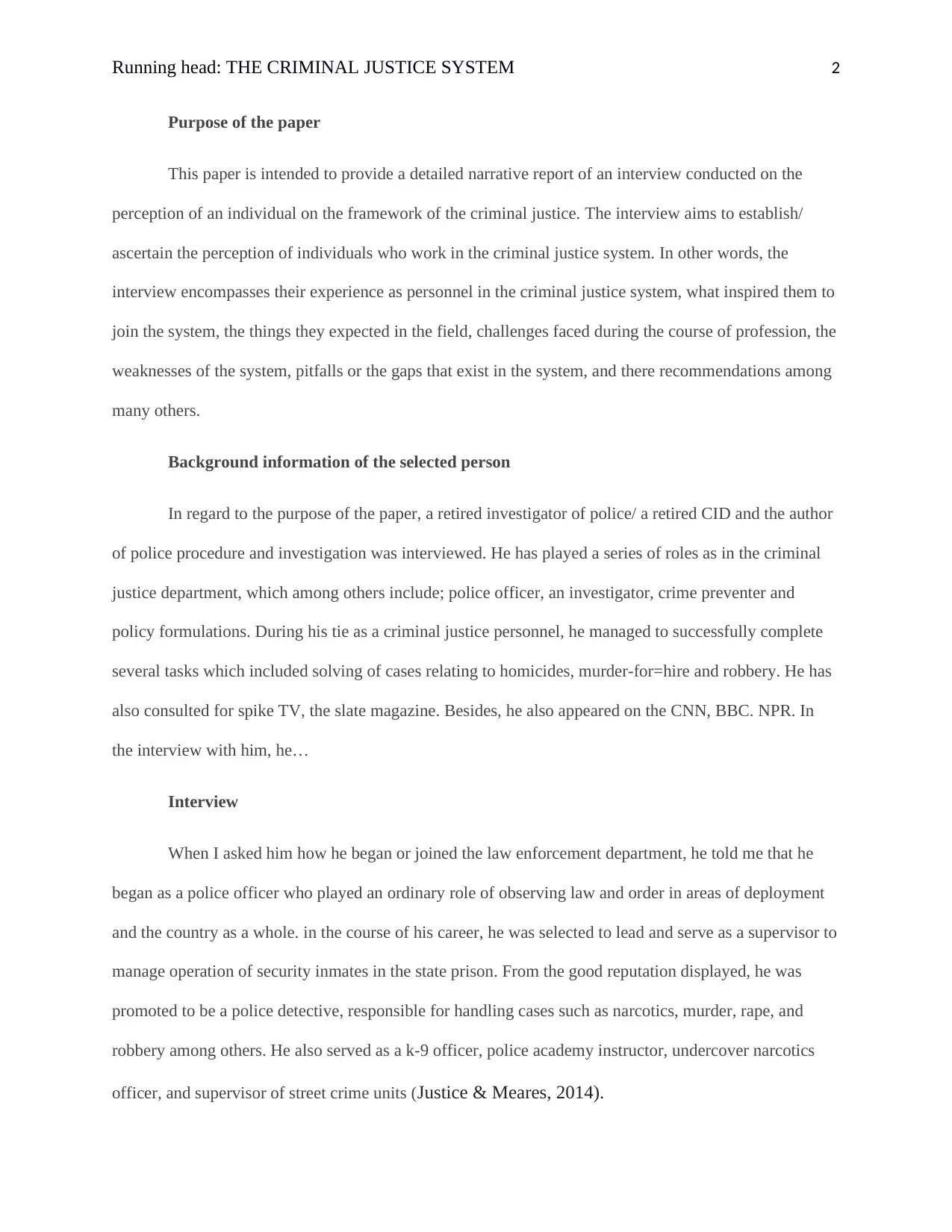
Running head: THE CRIMINAL JUSTICE SYSTEM 2
Purpose of the paper
This paper is intended to provide a detailed narrative report of an interview conducted on the
perception of an individual on the framework of the criminal justice. The interview aims to establish/
ascertain the perception of individuals who work in the criminal justice system. In other words, the
interview encompasses their experience as personnel in the criminal justice system, what inspired them to
join the system, the things they expected in the field, challenges faced during the course of profession, the
weaknesses of the system, pitfalls or the gaps that exist in the system, and there recommendations among
many others.
Background information of the selected person
In regard to the purpose of the paper, a retired investigator of police/ a retired CID and the author
of police procedure and investigation was interviewed. He has played a series of roles as in the criminal
justice department, which among others include; police officer, an investigator, crime preventer and
policy formulations. During his tie as a criminal justice personnel, he managed to successfully complete
several tasks which included solving of cases relating to homicides, murder-for=hire and robbery. He has
also consulted for spike TV, the slate magazine. Besides, he also appeared on the CNN, BBC. NPR. In
the interview with him, he…
Interview
When I asked him how he began or joined the law enforcement department, he told me that he
began as a police officer who played an ordinary role of observing law and order in areas of deployment
and the country as a whole. in the course of his career, he was selected to lead and serve as a supervisor to
manage operation of security inmates in the state prison. From the good reputation displayed, he was
promoted to be a police detective, responsible for handling cases such as narcotics, murder, rape, and
robbery among others. He also served as a k-9 officer, police academy instructor, undercover narcotics
officer, and supervisor of street crime units (Justice & Meares, 2014).
Purpose of the paper
This paper is intended to provide a detailed narrative report of an interview conducted on the
perception of an individual on the framework of the criminal justice. The interview aims to establish/
ascertain the perception of individuals who work in the criminal justice system. In other words, the
interview encompasses their experience as personnel in the criminal justice system, what inspired them to
join the system, the things they expected in the field, challenges faced during the course of profession, the
weaknesses of the system, pitfalls or the gaps that exist in the system, and there recommendations among
many others.
Background information of the selected person
In regard to the purpose of the paper, a retired investigator of police/ a retired CID and the author
of police procedure and investigation was interviewed. He has played a series of roles as in the criminal
justice department, which among others include; police officer, an investigator, crime preventer and
policy formulations. During his tie as a criminal justice personnel, he managed to successfully complete
several tasks which included solving of cases relating to homicides, murder-for=hire and robbery. He has
also consulted for spike TV, the slate magazine. Besides, he also appeared on the CNN, BBC. NPR. In
the interview with him, he…
Interview
When I asked him how he began or joined the law enforcement department, he told me that he
began as a police officer who played an ordinary role of observing law and order in areas of deployment
and the country as a whole. in the course of his career, he was selected to lead and serve as a supervisor to
manage operation of security inmates in the state prison. From the good reputation displayed, he was
promoted to be a police detective, responsible for handling cases such as narcotics, murder, rape, and
robbery among others. He also served as a k-9 officer, police academy instructor, undercover narcotics
officer, and supervisor of street crime units (Justice & Meares, 2014).
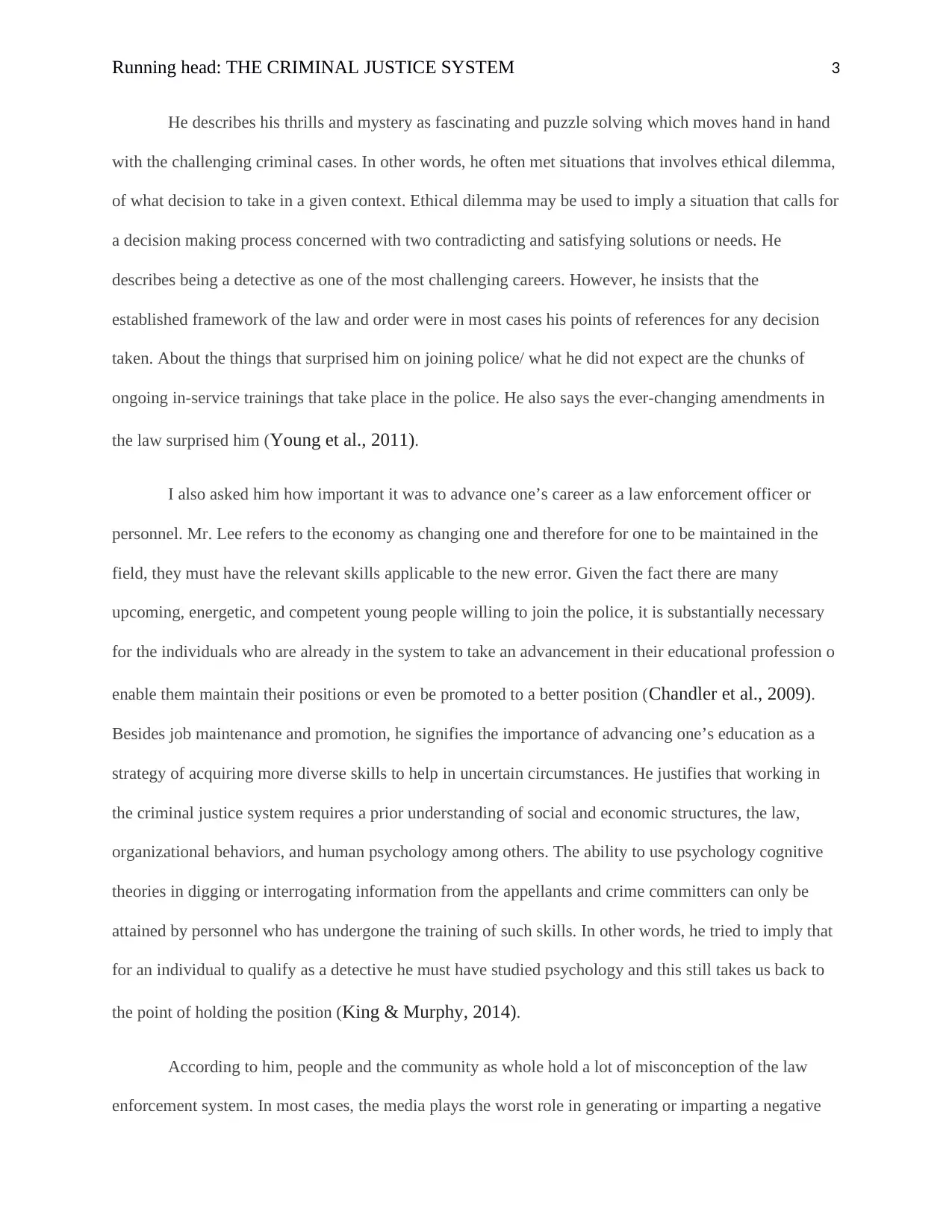
Running head: THE CRIMINAL JUSTICE SYSTEM 3
He describes his thrills and mystery as fascinating and puzzle solving which moves hand in hand
with the challenging criminal cases. In other words, he often met situations that involves ethical dilemma,
of what decision to take in a given context. Ethical dilemma may be used to imply a situation that calls for
a decision making process concerned with two contradicting and satisfying solutions or needs. He
describes being a detective as one of the most challenging careers. However, he insists that the
established framework of the law and order were in most cases his points of references for any decision
taken. About the things that surprised him on joining police/ what he did not expect are the chunks of
ongoing in-service trainings that take place in the police. He also says the ever-changing amendments in
the law surprised him (Young et al., 2011).
I also asked him how important it was to advance one’s career as a law enforcement officer or
personnel. Mr. Lee refers to the economy as changing one and therefore for one to be maintained in the
field, they must have the relevant skills applicable to the new error. Given the fact there are many
upcoming, energetic, and competent young people willing to join the police, it is substantially necessary
for the individuals who are already in the system to take an advancement in their educational profession o
enable them maintain their positions or even be promoted to a better position (Chandler et al., 2009).
Besides job maintenance and promotion, he signifies the importance of advancing one’s education as a
strategy of acquiring more diverse skills to help in uncertain circumstances. He justifies that working in
the criminal justice system requires a prior understanding of social and economic structures, the law,
organizational behaviors, and human psychology among others. The ability to use psychology cognitive
theories in digging or interrogating information from the appellants and crime committers can only be
attained by personnel who has undergone the training of such skills. In other words, he tried to imply that
for an individual to qualify as a detective he must have studied psychology and this still takes us back to
the point of holding the position (King & Murphy, 2014).
According to him, people and the community as whole hold a lot of misconception of the law
enforcement system. In most cases, the media plays the worst role in generating or imparting a negative
He describes his thrills and mystery as fascinating and puzzle solving which moves hand in hand
with the challenging criminal cases. In other words, he often met situations that involves ethical dilemma,
of what decision to take in a given context. Ethical dilemma may be used to imply a situation that calls for
a decision making process concerned with two contradicting and satisfying solutions or needs. He
describes being a detective as one of the most challenging careers. However, he insists that the
established framework of the law and order were in most cases his points of references for any decision
taken. About the things that surprised him on joining police/ what he did not expect are the chunks of
ongoing in-service trainings that take place in the police. He also says the ever-changing amendments in
the law surprised him (Young et al., 2011).
I also asked him how important it was to advance one’s career as a law enforcement officer or
personnel. Mr. Lee refers to the economy as changing one and therefore for one to be maintained in the
field, they must have the relevant skills applicable to the new error. Given the fact there are many
upcoming, energetic, and competent young people willing to join the police, it is substantially necessary
for the individuals who are already in the system to take an advancement in their educational profession o
enable them maintain their positions or even be promoted to a better position (Chandler et al., 2009).
Besides job maintenance and promotion, he signifies the importance of advancing one’s education as a
strategy of acquiring more diverse skills to help in uncertain circumstances. He justifies that working in
the criminal justice system requires a prior understanding of social and economic structures, the law,
organizational behaviors, and human psychology among others. The ability to use psychology cognitive
theories in digging or interrogating information from the appellants and crime committers can only be
attained by personnel who has undergone the training of such skills. In other words, he tried to imply that
for an individual to qualify as a detective he must have studied psychology and this still takes us back to
the point of holding the position (King & Murphy, 2014).
According to him, people and the community as whole hold a lot of misconception of the law
enforcement system. In most cases, the media plays the worst role in generating or imparting a negative
⊘ This is a preview!⊘
Do you want full access?
Subscribe today to unlock all pages.

Trusted by 1+ million students worldwide
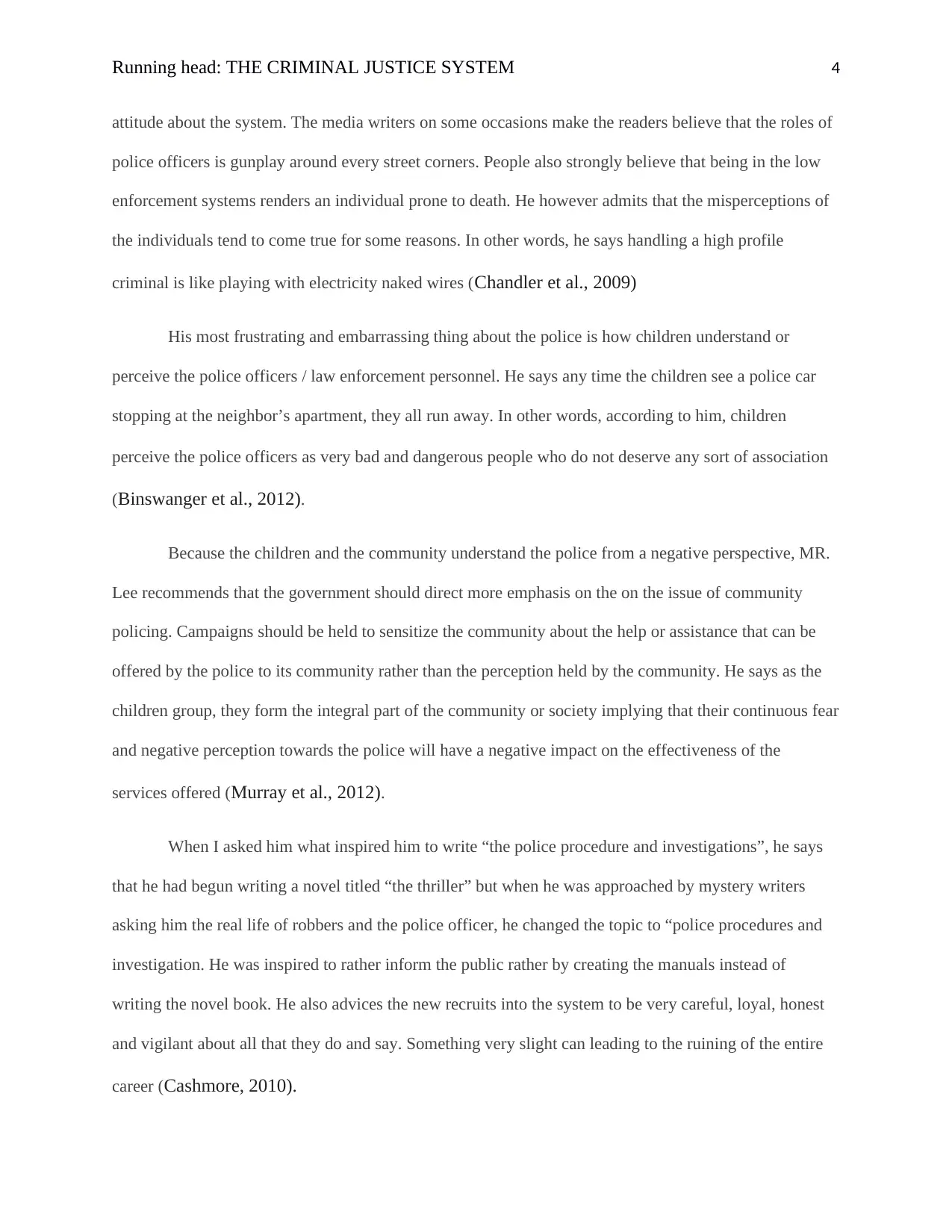
Running head: THE CRIMINAL JUSTICE SYSTEM 4
attitude about the system. The media writers on some occasions make the readers believe that the roles of
police officers is gunplay around every street corners. People also strongly believe that being in the low
enforcement systems renders an individual prone to death. He however admits that the misperceptions of
the individuals tend to come true for some reasons. In other words, he says handling a high profile
criminal is like playing with electricity naked wires (Chandler et al., 2009)
His most frustrating and embarrassing thing about the police is how children understand or
perceive the police officers / law enforcement personnel. He says any time the children see a police car
stopping at the neighbor’s apartment, they all run away. In other words, according to him, children
perceive the police officers as very bad and dangerous people who do not deserve any sort of association
(Binswanger et al., 2012).
Because the children and the community understand the police from a negative perspective, MR.
Lee recommends that the government should direct more emphasis on the on the issue of community
policing. Campaigns should be held to sensitize the community about the help or assistance that can be
offered by the police to its community rather than the perception held by the community. He says as the
children group, they form the integral part of the community or society implying that their continuous fear
and negative perception towards the police will have a negative impact on the effectiveness of the
services offered (Murray et al., 2012).
When I asked him what inspired him to write “the police procedure and investigations”, he says
that he had begun writing a novel titled “the thriller” but when he was approached by mystery writers
asking him the real life of robbers and the police officer, he changed the topic to “police procedures and
investigation. He was inspired to rather inform the public rather by creating the manuals instead of
writing the novel book. He also advices the new recruits into the system to be very careful, loyal, honest
and vigilant about all that they do and say. Something very slight can leading to the ruining of the entire
career (Cashmore, 2010).
attitude about the system. The media writers on some occasions make the readers believe that the roles of
police officers is gunplay around every street corners. People also strongly believe that being in the low
enforcement systems renders an individual prone to death. He however admits that the misperceptions of
the individuals tend to come true for some reasons. In other words, he says handling a high profile
criminal is like playing with electricity naked wires (Chandler et al., 2009)
His most frustrating and embarrassing thing about the police is how children understand or
perceive the police officers / law enforcement personnel. He says any time the children see a police car
stopping at the neighbor’s apartment, they all run away. In other words, according to him, children
perceive the police officers as very bad and dangerous people who do not deserve any sort of association
(Binswanger et al., 2012).
Because the children and the community understand the police from a negative perspective, MR.
Lee recommends that the government should direct more emphasis on the on the issue of community
policing. Campaigns should be held to sensitize the community about the help or assistance that can be
offered by the police to its community rather than the perception held by the community. He says as the
children group, they form the integral part of the community or society implying that their continuous fear
and negative perception towards the police will have a negative impact on the effectiveness of the
services offered (Murray et al., 2012).
When I asked him what inspired him to write “the police procedure and investigations”, he says
that he had begun writing a novel titled “the thriller” but when he was approached by mystery writers
asking him the real life of robbers and the police officer, he changed the topic to “police procedures and
investigation. He was inspired to rather inform the public rather by creating the manuals instead of
writing the novel book. He also advices the new recruits into the system to be very careful, loyal, honest
and vigilant about all that they do and say. Something very slight can leading to the ruining of the entire
career (Cashmore, 2010).
Paraphrase This Document
Need a fresh take? Get an instant paraphrase of this document with our AI Paraphraser
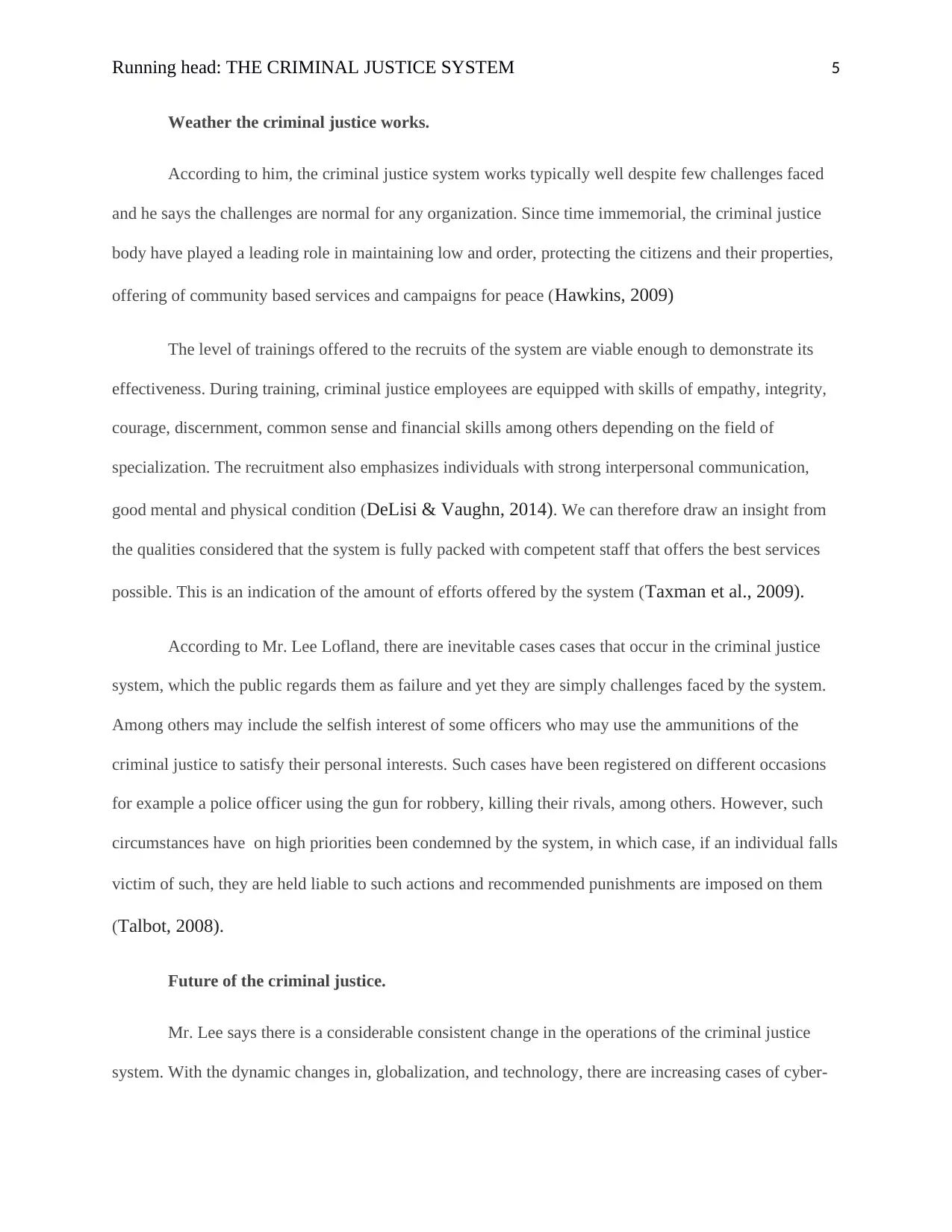
Running head: THE CRIMINAL JUSTICE SYSTEM 5
Weather the criminal justice works.
According to him, the criminal justice system works typically well despite few challenges faced
and he says the challenges are normal for any organization. Since time immemorial, the criminal justice
body have played a leading role in maintaining low and order, protecting the citizens and their properties,
offering of community based services and campaigns for peace (Hawkins, 2009)
The level of trainings offered to the recruits of the system are viable enough to demonstrate its
effectiveness. During training, criminal justice employees are equipped with skills of empathy, integrity,
courage, discernment, common sense and financial skills among others depending on the field of
specialization. The recruitment also emphasizes individuals with strong interpersonal communication,
good mental and physical condition (DeLisi & Vaughn, 2014). We can therefore draw an insight from
the qualities considered that the system is fully packed with competent staff that offers the best services
possible. This is an indication of the amount of efforts offered by the system (Taxman et al., 2009).
According to Mr. Lee Lofland, there are inevitable cases cases that occur in the criminal justice
system, which the public regards them as failure and yet they are simply challenges faced by the system.
Among others may include the selfish interest of some officers who may use the ammunitions of the
criminal justice to satisfy their personal interests. Such cases have been registered on different occasions
for example a police officer using the gun for robbery, killing their rivals, among others. However, such
circumstances have on high priorities been condemned by the system, in which case, if an individual falls
victim of such, they are held liable to such actions and recommended punishments are imposed on them
(Talbot, 2008).
Future of the criminal justice.
Mr. Lee says there is a considerable consistent change in the operations of the criminal justice
system. With the dynamic changes in, globalization, and technology, there are increasing cases of cyber-
Weather the criminal justice works.
According to him, the criminal justice system works typically well despite few challenges faced
and he says the challenges are normal for any organization. Since time immemorial, the criminal justice
body have played a leading role in maintaining low and order, protecting the citizens and their properties,
offering of community based services and campaigns for peace (Hawkins, 2009)
The level of trainings offered to the recruits of the system are viable enough to demonstrate its
effectiveness. During training, criminal justice employees are equipped with skills of empathy, integrity,
courage, discernment, common sense and financial skills among others depending on the field of
specialization. The recruitment also emphasizes individuals with strong interpersonal communication,
good mental and physical condition (DeLisi & Vaughn, 2014). We can therefore draw an insight from
the qualities considered that the system is fully packed with competent staff that offers the best services
possible. This is an indication of the amount of efforts offered by the system (Taxman et al., 2009).
According to Mr. Lee Lofland, there are inevitable cases cases that occur in the criminal justice
system, which the public regards them as failure and yet they are simply challenges faced by the system.
Among others may include the selfish interest of some officers who may use the ammunitions of the
criminal justice to satisfy their personal interests. Such cases have been registered on different occasions
for example a police officer using the gun for robbery, killing their rivals, among others. However, such
circumstances have on high priorities been condemned by the system, in which case, if an individual falls
victim of such, they are held liable to such actions and recommended punishments are imposed on them
(Talbot, 2008).
Future of the criminal justice.
Mr. Lee says there is a considerable consistent change in the operations of the criminal justice
system. With the dynamic changes in, globalization, and technology, there are increasing cases of cyber-

Running head: THE CRIMINAL JUSTICE SYSTEM 6
crimes and threats. This calls for changes in the type of knowledge needed by the personnel operating in
the system. They should be well trained and equipped with technological skills to be able to handle the
cases involved (Fast & Conry, 2009).
Mr. Lee recommends the justice system to adopt community-policing, sensitization of the
community on the relevance of criminal justice system and promoting associative working of the
community with the system. Criminal justice system also ought to adapt new technologies and staff
retraining which will in turn respond to the changing world of technology
crimes and threats. This calls for changes in the type of knowledge needed by the personnel operating in
the system. They should be well trained and equipped with technological skills to be able to handle the
cases involved (Fast & Conry, 2009).
Mr. Lee recommends the justice system to adopt community-policing, sensitization of the
community on the relevance of criminal justice system and promoting associative working of the
community with the system. Criminal justice system also ought to adapt new technologies and staff
retraining which will in turn respond to the changing world of technology
⊘ This is a preview!⊘
Do you want full access?
Subscribe today to unlock all pages.

Trusted by 1+ million students worldwide
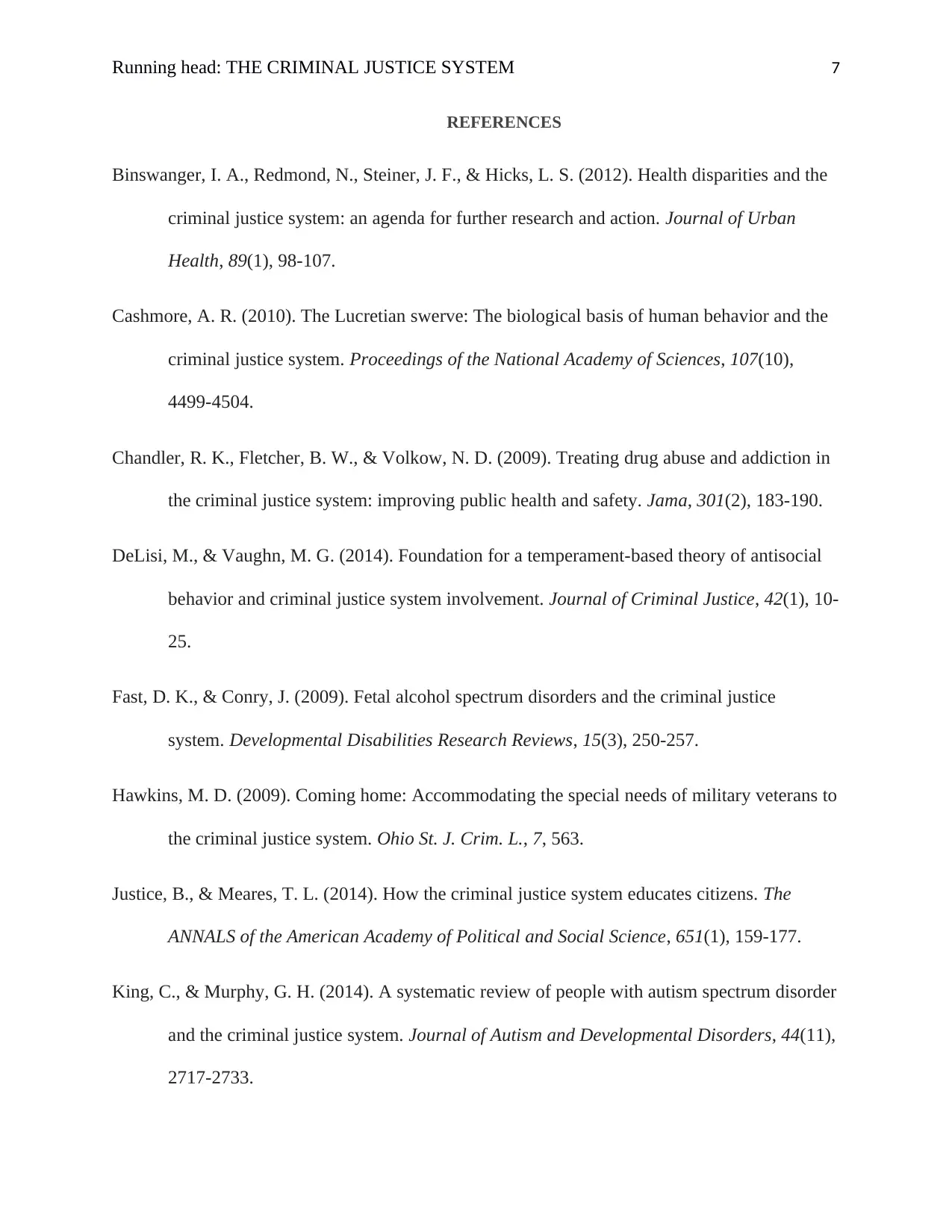
Running head: THE CRIMINAL JUSTICE SYSTEM 7
REFERENCES
Binswanger, I. A., Redmond, N., Steiner, J. F., & Hicks, L. S. (2012). Health disparities and the
criminal justice system: an agenda for further research and action. Journal of Urban
Health, 89(1), 98-107.
Cashmore, A. R. (2010). The Lucretian swerve: The biological basis of human behavior and the
criminal justice system. Proceedings of the National Academy of Sciences, 107(10),
4499-4504.
Chandler, R. K., Fletcher, B. W., & Volkow, N. D. (2009). Treating drug abuse and addiction in
the criminal justice system: improving public health and safety. Jama, 301(2), 183-190.
DeLisi, M., & Vaughn, M. G. (2014). Foundation for a temperament-based theory of antisocial
behavior and criminal justice system involvement. Journal of Criminal Justice, 42(1), 10-
25.
Fast, D. K., & Conry, J. (2009). Fetal alcohol spectrum disorders and the criminal justice
system. Developmental Disabilities Research Reviews, 15(3), 250-257.
Hawkins, M. D. (2009). Coming home: Accommodating the special needs of military veterans to
the criminal justice system. Ohio St. J. Crim. L., 7, 563.
Justice, B., & Meares, T. L. (2014). How the criminal justice system educates citizens. The
ANNALS of the American Academy of Political and Social Science, 651(1), 159-177.
King, C., & Murphy, G. H. (2014). A systematic review of people with autism spectrum disorder
and the criminal justice system. Journal of Autism and Developmental Disorders, 44(11),
2717-2733.
REFERENCES
Binswanger, I. A., Redmond, N., Steiner, J. F., & Hicks, L. S. (2012). Health disparities and the
criminal justice system: an agenda for further research and action. Journal of Urban
Health, 89(1), 98-107.
Cashmore, A. R. (2010). The Lucretian swerve: The biological basis of human behavior and the
criminal justice system. Proceedings of the National Academy of Sciences, 107(10),
4499-4504.
Chandler, R. K., Fletcher, B. W., & Volkow, N. D. (2009). Treating drug abuse and addiction in
the criminal justice system: improving public health and safety. Jama, 301(2), 183-190.
DeLisi, M., & Vaughn, M. G. (2014). Foundation for a temperament-based theory of antisocial
behavior and criminal justice system involvement. Journal of Criminal Justice, 42(1), 10-
25.
Fast, D. K., & Conry, J. (2009). Fetal alcohol spectrum disorders and the criminal justice
system. Developmental Disabilities Research Reviews, 15(3), 250-257.
Hawkins, M. D. (2009). Coming home: Accommodating the special needs of military veterans to
the criminal justice system. Ohio St. J. Crim. L., 7, 563.
Justice, B., & Meares, T. L. (2014). How the criminal justice system educates citizens. The
ANNALS of the American Academy of Political and Social Science, 651(1), 159-177.
King, C., & Murphy, G. H. (2014). A systematic review of people with autism spectrum disorder
and the criminal justice system. Journal of Autism and Developmental Disorders, 44(11),
2717-2733.
Paraphrase This Document
Need a fresh take? Get an instant paraphrase of this document with our AI Paraphraser
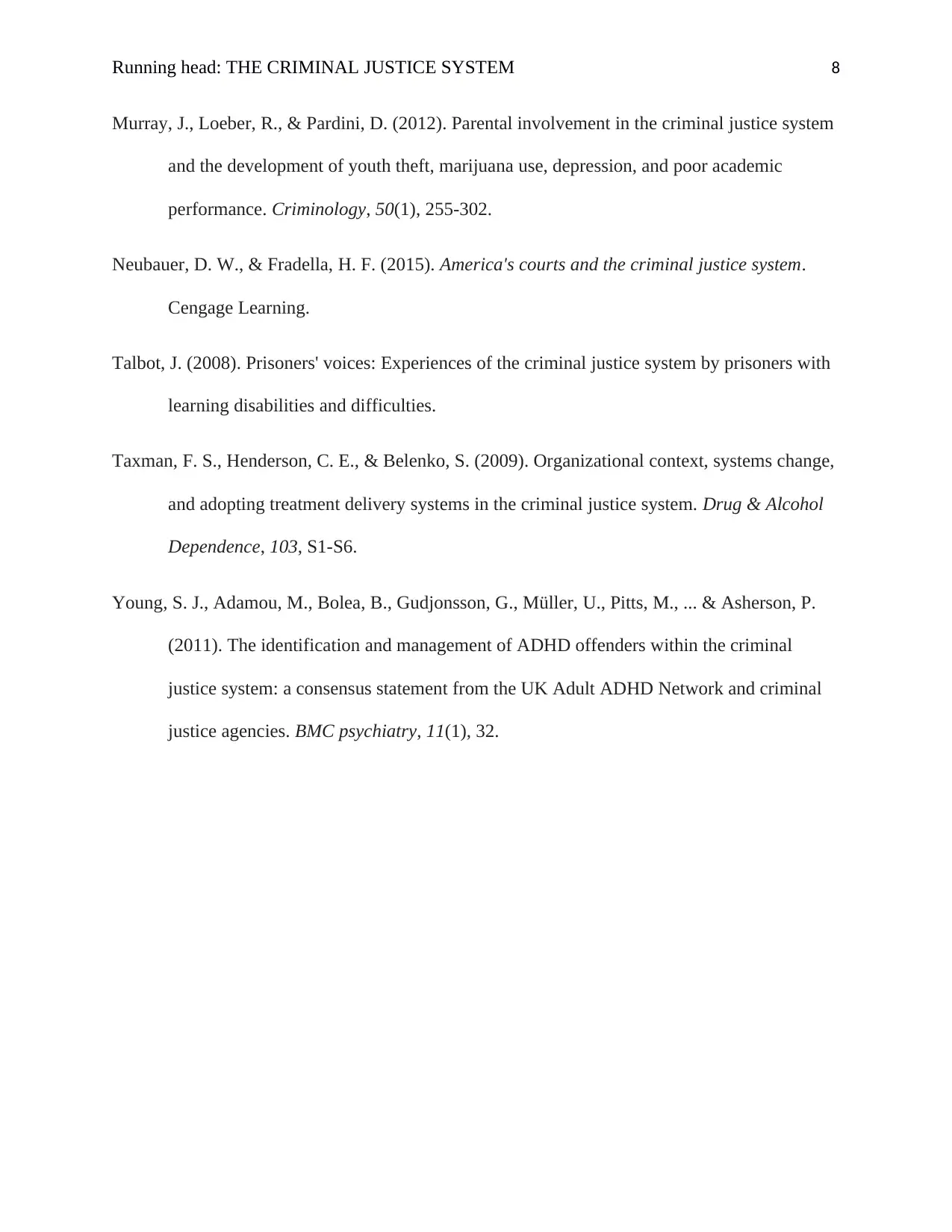
Running head: THE CRIMINAL JUSTICE SYSTEM 8
Murray, J., Loeber, R., & Pardini, D. (2012). Parental involvement in the criminal justice system
and the development of youth theft, marijuana use, depression, and poor academic
performance. Criminology, 50(1), 255-302.
Neubauer, D. W., & Fradella, H. F. (2015). America's courts and the criminal justice system.
Cengage Learning.
Talbot, J. (2008). Prisoners' voices: Experiences of the criminal justice system by prisoners with
learning disabilities and difficulties.
Taxman, F. S., Henderson, C. E., & Belenko, S. (2009). Organizational context, systems change,
and adopting treatment delivery systems in the criminal justice system. Drug & Alcohol
Dependence, 103, S1-S6.
Young, S. J., Adamou, M., Bolea, B., Gudjonsson, G., Müller, U., Pitts, M., ... & Asherson, P.
(2011). The identification and management of ADHD offenders within the criminal
justice system: a consensus statement from the UK Adult ADHD Network and criminal
justice agencies. BMC psychiatry, 11(1), 32.
Murray, J., Loeber, R., & Pardini, D. (2012). Parental involvement in the criminal justice system
and the development of youth theft, marijuana use, depression, and poor academic
performance. Criminology, 50(1), 255-302.
Neubauer, D. W., & Fradella, H. F. (2015). America's courts and the criminal justice system.
Cengage Learning.
Talbot, J. (2008). Prisoners' voices: Experiences of the criminal justice system by prisoners with
learning disabilities and difficulties.
Taxman, F. S., Henderson, C. E., & Belenko, S. (2009). Organizational context, systems change,
and adopting treatment delivery systems in the criminal justice system. Drug & Alcohol
Dependence, 103, S1-S6.
Young, S. J., Adamou, M., Bolea, B., Gudjonsson, G., Müller, U., Pitts, M., ... & Asherson, P.
(2011). The identification and management of ADHD offenders within the criminal
justice system: a consensus statement from the UK Adult ADHD Network and criminal
justice agencies. BMC psychiatry, 11(1), 32.
1 out of 8
Related Documents
Your All-in-One AI-Powered Toolkit for Academic Success.
+13062052269
info@desklib.com
Available 24*7 on WhatsApp / Email
![[object Object]](/_next/static/media/star-bottom.7253800d.svg)
Unlock your academic potential
Copyright © 2020–2025 A2Z Services. All Rights Reserved. Developed and managed by ZUCOL.





